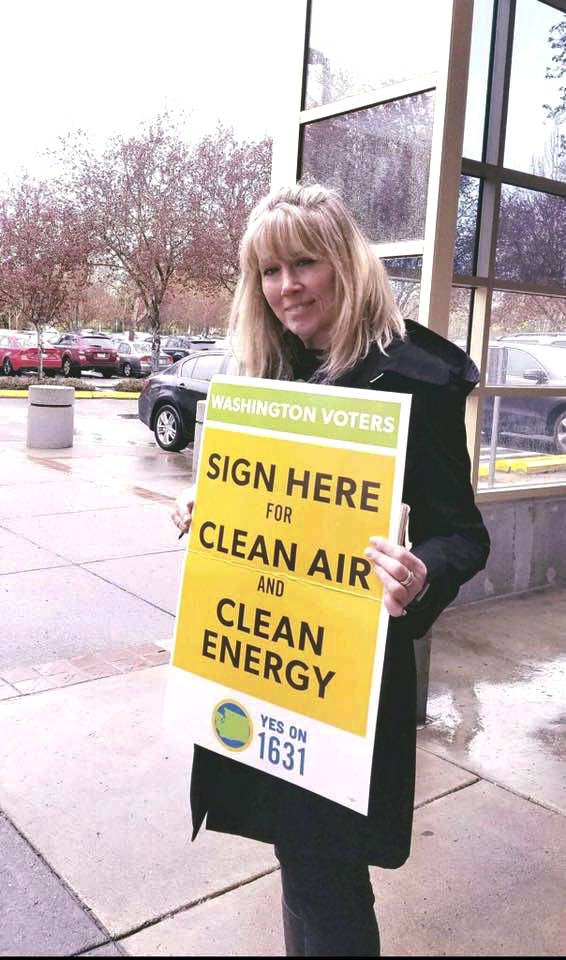A carbon fee initiative could be on Washington state’s November’s ballot if activists succeed in gathering enough signatures in coming months.
A kickoff meeting was held on April 9 in south Seattle by the Alliance for Jobs and Clean Energy in an effort to gather 260,000 signatures by July 6, which would place Initiative 1631 before voters in November. The initiative would levy a $15 per ton fee on carbon emissions from large carbon emitters beginning in 2020, which would rise by $2 per ton each year, adjusted for inflation.
By 2035 it would hit roughly $55 per ton, adjusted for inflation, and either freeze or continue rising depending on whether Washington state was meeting its greenhouse gas targets of reducing emissions to 25 percent below 1990 levels, according to Carbon Washington.
This fee could increase the cost of gas by roughly 15 cents per gallon. This is lower than previously proposed costs under the Carbon Washington-sponsored I-732, which failed on the 2016 ballot and which would have implemented a $62 per ton fee by 2035. Both proposals’ fee structures lag behind a similar voter-approved measure in British Columbia, which will raise taxes to $50 per ton by 2021.
Large emitters that would be taxed include power plants using fossil fuels or power providers that import electricity generated from fossil fuels, vehicle fuel suppliers and other categories of energy suppliers that produce large quantities of carbon emissions.
While Carbon Washington didn’t write the initiative, executive director Kyle Murphy said they would be pleased to see a carbon fee put before voters. The organization has not officially endorsed the initiative.
Initiative 1631 is a fee instead of a tax that, while subtle, affects how revenue can be spent and restricts the state to using money generated only on carbon and pollution-related issues. Carbon reduction and clean air investments will receive 70 percent of the total revenue from the fee. Within that sum, a portion will go to workers and support for low-income households. The investments allowed can be spent on a wide range of improvements ranging from providing heating assistance to low-income families, to building hydroelectric storage facilities and investing in electric buses. Funding for water quality and forest health projects will receive money too.
Previous initiatives had included a low-income rebate or a car tab reduction. While I-1631 does not include this, it mandates that 15 percent of funds going towards clean energy and utility company rebates must be used to prevent low-income people from suffering economically. Some 35 percent of all funds would provide benefits to regions of the state that face significant harm from environmental health impacts. These regions must be drawn up and approved by the state. Finally, it sets aside $50 million to provide full pension, salary and health benefits for two years to fossil fuel workers who lose their jobs as a result of the initiative.
According to 350 Seattle figures, the initiative would raise more than $800 million annually with more than $280 million being invested in marginalized communities. However, this re-investment would be done through government investments instead of individual rebates, as proposed in previous initiatives.
Peter Bloch Garcia represents the Latino Community Fund of Washington state and said the organization is a part of the Alliance for Jobs and Clean Energy. A large percentage of Latinos the organization works with feel that action needs to be taken on climate change, he said. Communities of color both in Puget Sound and in rural parts of the state are more likely to be hurt by climate change by living near polluters, impacts to agriculture-based jobs or increasing wildfires.
“We feel really strongly that the benefit to our state is going to have a huge impact on creating less pollution, which is not just about the climate, but about the health of families in our state,” Bloch Garcia said.
Importantly, Bloch Garcia said the initiative would give community leaders a place at the table as the state invested money into green jobs and technology. Bloch Garcia said the current initiative is more equitable than previously attempted carbon reduction strategies.
The initiative would create a board with 15 voting members comprised of representatives from state agencies to oversee the implementation of the initiative. The governor would appoint four at-large positions, one of which must be a tribal representative and another representative from a community vulnerable to adverse effects from pollution. Three additional panels would be created to provide recommendations on how the initiative should be implemented. At least one-third of the members must be from vulnerable communities.
Initiative 1631 would allow utilities to reclaim up to 100 percent of the carbon tax paid by customers if they spend the revenue on carbon reduction plans approved by regulators. Some 23 high-energy business classes would also be exempt from paying the carbon tax to keep Washington competitive in attracting manufacturers and it would allow the state Department of Commerce to develop criteria for allowing more exemptions.
Another notable exemption is for emissions from the Centralia Power Plant, a coal-burning plant in southwest Washington that is scheduled to close by 2025. According to an agreement reached between the plant, state and environmental groups, it is exempt from further emissions regulations until its closure. This was not challenged in I-1631.
In 2016, I-732 was voted down by 59 percent of voters statewide, with only King County netting a narrow majority in favor of the tax. Another carbon tax proposal died in the state Senate during the 2018 legislative session. No state in the U.S. currently has a carbon tax.
Talk to us
Please share your story tips by emailing editor@kentreporter.com.
To share your opinion for publication, submit a letter through our website https://www.kentreporter.com/submit-letter/. Include your name, address and daytime phone number. (We’ll only publish your name and hometown.) Please keep letters to 300 words or less.

